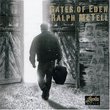| All Artists: Gustav Mahler, Jascha Horenstein, Janet Baker, London Symphony Orchestra, Scottish National Orchestra Title: Mahler: Symphony No. 9 Members Wishing: 1 Total Copies: 0 Label: BBC Legends Original Release Date: 1/1/1966 Re-Release Date: 10/23/2001 Genres: Pop, Classical Styles: Vocal Pop, Symphonies Number of Discs: 2 SwapaCD Credits: 2 UPC: 684911407525 |
Search - Gustav Mahler, Jascha Horenstein, Janet Baker :: Mahler: Symphony No. 9
 | Gustav Mahler, Jascha Horenstein, Janet Baker Mahler: Symphony No. 9 Genres: Pop, Classical
Jascha Horenstein's live stereo Mahler 9th has not been previously available, though another live 1966 performance with the LSO, in mono, has circulated on the Music & Arts label, as has his 1953 studio recording for V... more » |
Larger Image |
CD DetailsSynopsis
Amazon.com Jascha Horenstein's live stereo Mahler 9th has not been previously available, though another live 1966 performance with the LSO, in mono, has circulated on the Music & Arts label, as has his 1953 studio recording for Vox. That may be all fans of Horenstein's Mahler will need to know. Others should hear his grim, if sometimes understated, view of the composer's last completed symphony. The long first and last movements of the work, each nearly a half-hour long, are especially devastating in their bleakness, though the final moments achieve a hard-won tranquility. The main weakness, hardly fatal but regrettable even in a concert performance, is the ragged orchestral work in the Rondo-Burlesque. The Kindertotenlieder features the wonderful Janet Baker, whose passionate version recorded for EMI with Sir John Barbirolli a few months after this mono 1967 concert is unbeatable. Here, balanced far forward of the orchestra and partnered with a more objective conductor, she's inhibited interpretively, though still radiant vocally. --Dan Davis Similar CDs
|
CD ReviewsUneven but interesting L. Johan Mod�e | Earth | 08/03/2004 (3 out of 5 stars) "This live stereo recording of a Horenstein Mahler 9 deserves its place in every Mahlerite collection, mainly for the first and last movements - the first in particular. The two other movements are less memorable or even to forget. Moreover, the sound is not great but OK. The audience's behavior is acceptable. An oddity is the applauses between movements. Pros first: I am not a fan of Horenstein, but it must be said that his interpretation of the first movement is impressive. Especially the climaxes come off very well. Excellent brass playing! Considering the last movement, it is getting a very slow presentation. Although I prefer the swift takes, such as Kubelik's (Audite, live) and Walter's (EMI, live), Horenstein's sensitive grasp is more convincing, than, say, Karajan's simplified and syrup-sentimental view (DG, live). Cons: Here we have the second movement, of which Horenstein doesn't make anything interesting. Compare with Klemperer (EMI)! The third movement, finally, is deeply problematic for other reasons, with playing "out of bounds". How bad is it? It is one thing to be out of key, if we talk about winds and brass. But it is another thing to be out of tune, which is the matter here. At the end of the movement the timpanist is bars ahead of the rest. It sounds very odd if you know the piece. Who's to blame? Horenstein is the usual suspect, I suppose. All rehearsal concentration put on the first and last movements; the two inner sections performed on routine. The present recording can be recommended anyway, but certainly not as a first choice. Go for Barenboim (Teldec) or Abbado (DG) you want a great live, and for Ancerl (Supraphon) or Klemperer (EMI) if you want an excellent studio take. " One of the premiere Mahler 9ths R. J. Claster | Van Nuys, CA United States | 08/28/2002 (5 out of 5 stars) "This live performance from 1966, in very good stereo sound (in particular it captures effectively the concert hall ambience in a way that makes most studio recordings sound antiseptic by comparison), is one of the most powerful I have heard of this music. It achieves its impact through a weight and emphatic intensity of utterance that highlights the dark, fatalistic elements of the music rather than its songful, lyrical qualities, as with Barbirolli-Berlin (or, to a lessor extent, the live Kubelik on Audite, which may be the most balanced interpretation of the 9th), or its volatile, manic changes of mood, as with Bernstein. Although the orchestral execution of the Rondo-Burleske is, admittedly, somewhat disjointed in spots, Horenstein achieves both a seamless flow and unbroken concentration of mood in the sublime concluding adagio movement, surpassing in these aspects most other performances I have heard. Expensive, yes, but an essential purchase for dedicated Mahlerians." A true masterpiece Will Saar | ramapo valley, NJ | 12/11/2001 (5 out of 5 stars) "it's like horenstein's advance from the vox (vienna symphony) version of bruckner's 9th, and his bbc philharmonic offering, decades later. the difference is obvious. this recording shows similar maturity, compared to the vox version of horenstein's 'youth'. relativity aside, as a stand-alone performance it maps out most insightfully what can only be said to be the last work of an era. unlike klemperer, this version doesn't seem to overburden one,(though that may have been mahler's intent...)opting instead for a deeply spiritual, fascinating journey through life and what may lie beyond, tempered by an emerging acceptance of both. the botched parts referred to above seem to be a staple of some of horensteins later conducting, and i dont put it in the realm of impossibility to suggest it intentional, as it would further inform the chaotic ambience of the movement...
rest assured this one is a keeper." |

 Track Listings (3) - Disc #1
Track Listings (3) - Disc #1


